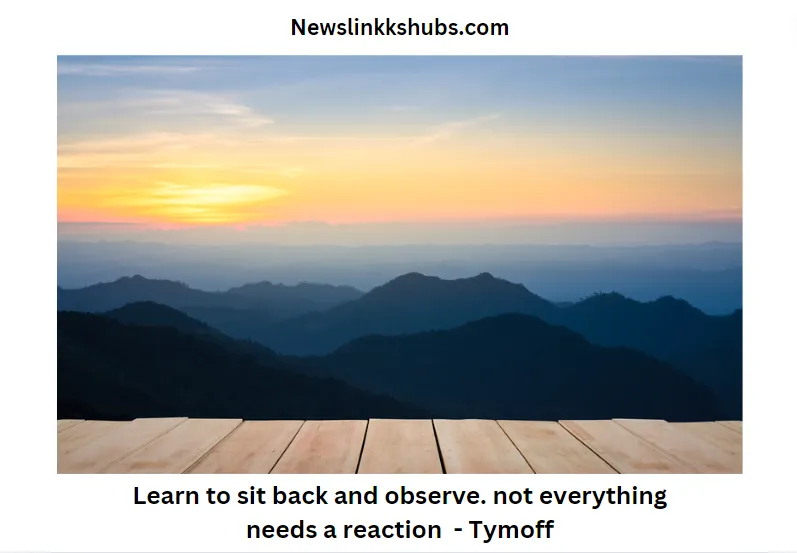Learn to sit back and observe. not everything needs a reaction – Tymoff

Sitting back and observing through mindfulness techniques and meditation teaches patience and wisdom. Incorporating these practices into your daily routine can help develop emotional intelligence and stress management skills. Only some things need immediate reaction or involvement; learning this can lead to more incredible personal growth and professional success.
In today’s fast-paced world, it’s easy to feel the need to react instantly. This constant state of urgency can lead to stress and poor decisions. Practising the art of observation allows you to gather more information and make thoughtful choices.
Incorporating mindfulness and meditation into your daily routine can significantly enhance observational skills. These practices help you stay present, reduce stress, and cultivate a more profound sense of awareness. Mindfulness techniques improve emotional intelligence, allowing you to navigate challenging situations with greater insight and composure.
It also helps you understand situations better and respond more effectively. This skill is crucial for personal growth and professional success. Taking a step back gives you clarity and perspective, ultimately leading to better outcomes. Embrace the power of observation and see how it transforms your life.
Contents
- 1 The Power of Observation
- 2 Historical Figures and the Art of Observation
- 3 Psychology Behind Quiet Observation
- 4 Practical Steps to Becoming a Better Observer
- 5 Observation in the Digital Age
- 6 Case Studies: Success Through Observation
- 7 Challenges in Mastering Quiet Wisdom
- 8 The Future of Observation
- 9 Frequently Asked Questions
- 10 Conclusion
The Power of Observation
The ability to observe can transform your life. Observing allows us to see things. We often rush through life, needing key details. Observing helps us understand our surroundings better.
Cultivating Quiet Wisdom
Quiet wisdom comes from profound observation. It doesn’t require loud actions. Instead, it values stillness and reflection. By sitting back, you notice more. You see patterns others miss. You learn from watching and listening. This wisdom grows over time, making you more insightful.
Benefits in Personal and Professional Life
Observation skills benefit both personal and professional life. Developing emotional intelligence and effective stress management techniques are vital advantages. These skills allow you to navigate challenging situations calmly and with greater insight.
Here are some key advantages:
- Better Decision Making: Observing helps you make informed choices, leading to better decision-making and stress management.
- Improved Relationships: You understand people better and connect deeply.
- Increased Creativity: Noticing details sparks new ideas.
- Enhanced Problem-Solving: You spot problems and solutions quicker.
| Personal Benefits | Professional Benefits |
| Stronger relationships | Better teamwork |
| Greater self-awareness | Higher productivity |
| More empathy | Improved leadership skills |
To sum up, learning to observe can enrich your life in many ways. Embrace the power of observation today!
Historical Figures and the Art of Observation
Many historical figures knew the power of observation. Philosophers like Socrates and Confucius emphasized the importance of observation in understanding human behaviour and society. In today’s digital age, technology aids and hinders our ability to observe. While access to information is unprecedented, the constant barrage of stimuli can overwhelm our senses. Balancing technological use with mindful observation is crucial for maintaining clarity and focus.
Philosophers and Their Quiet Wisdom
Philosophers like Socrates and Confucius valued observation. They watched the world and learned from it. Socrates used questions to guide others to wisdom. He observed how people thought and acted. Confucius focused on the importance of moral values. He observed society to understand how people could live better lives.
| Philosopher | Key Teaching | Observation Focus |
| Socrates | Questioning | Human Behavior |
| Confucius | Moral values | Society |
Leaders Who Listened
Great leaders like Abraham Lincoln and Mahatma Gandhi understood the importance of listening. Lincoln often listened more than he spoke, which helped him understand different perspectives. Gandhi observed his people’s struggles and used these observations to lead peaceful protests.
- Abraham Lincoln: Known for listening and understanding different views.
- Mahatma Gandhi: Observed social issues and led with empathy.
In modern times, leaders like Elon Musk and Bill Gates have shown that delayed reactions and careful observation of industry trends can lead to groundbreaking innovations. Their success stories highlight the importance of patience and strategic thinking.
Learning to observe can lead to greater wisdom. Historical figures show us the value of sitting back and watching. This can help us make better decisions and lead more effectively.
Psychology Behind Quiet Observation
Learning to sit back and observe is a powerful skill. Self-reflection plays a crucial role in enhancing these skills. Regularly reflecting on your experiences and reactions, you can develop a deeper understanding of your observational habits and improve them over time. Let’s dive into the psychology behind it.
The Role of Mindfulness
Mindfulness is critical to quiet observation. It means being present in the moment. Mindfulness helps you focus on what’s happening now, reduces distractions, and enhances awareness. When you’re mindful, you see things more clearly. You notice small details that others overlook, which can lead to better decision-making.
Cognitive Benefits of Being an Observer
Being an observer has many cognitive benefits. It sharpens your analytical skills. You learn to analyze situations more effectively. Your brain becomes better at processing information. Observation also boosts your memory. You remember details more easily when you’re attentive. This skill is helpful in many areas of life.
- Improved analytical skills
- Better information processing
- Enhanced memory retention
Observation can also foster creativity. When you observe, you gather new ideas. These ideas can inspire innovative solutions. Quiet observation allows you to step back and see the big picture. This broad perspective is valuable in problem-solving.
| Benefit | Description |
| Analytical Skills | Improves your ability to analyze situations. |
| Memory | It helps you remember details more easily. |
| Creativity | Inspires innovative solutions. |
Practical Steps to Becoming a Better Observer
Learning to sit back and observe can enhance your understanding of the world. Engaging in specific observational skills training, such as mindfulness exercises and focused attention practices, can significantly boost your ability to notice and interpret subtle details. Here are some practical steps to help you become a better observer.
Mindful Listening
Mindful listening involves paying full attention to the speaker. Avoid interrupting or planning your response. Focus on the words, tone, and body language. This helps in understanding the actual message being conveyed.
Here are some steps to practice mindful listening:
- Maintain eye contact
- Nod and use facial expressions
- Avoid distractions like phones
- Reflect on what is said before responding
The Power of Patience
Patience is crucial for observation. It allows you to see things unfold naturally. When you wait and watch, you notice more details. This can lead to deeper insights.
Consider these tips to harness the power of patience:
- Take deep breaths to calm your mind
- Resist the urge to react immediately
- Observe your surroundings quietly
- Give people time to express themselves
Observation in the Digital Age
In our fast-paced world, sitting back and observing is rare. Digital screens grab our attention constantly. Learning to observe quietly can be powerful. It helps us understand and connect better.
Social media is both a boon and a bane. It connects us but can overwhelm us. To observe correctly, you need to filter content wisely. Follow accounts that add value and avoid those that create stress. Practising digital detox, or taking breaks from screens, is crucial for mental health. Schedule screen-free hours daily, engage in offline activities, and practice mindfulness to improve focus and clarity.
| Positive Aspects | Negative Aspects |
| Connects with loved ones | Can cause stress |
| Source of knowledge | This may lead to misinformation |
Set specific times to check your feeds. This helps you stay in control. Observe how people interact and share. Learn from their experiences.
The Importance of Digital Detox
A digital detox is a break from screens. It helps you recharge. Your mind needs rest from constant information. This is crucial for mental health.
- Schedule screen-free hours daily.
- Engage in offline activities.
- Practice mindfulness and meditation.
During this detox, observe your surroundings. Notice small details you usually miss. This practice helps improve focus and clarity.
Remember, not everything needs your immediate reaction. Sit back, observe, and enjoy the present moment. This is the key to a balanced life.
Case Studies: Success Through Observation
Learning to sit back and observe can lead to great success. In modern times, leaders like Elon Musk and Bill Gates have shown that delayed reactions and careful observation of industry trends can lead to groundbreaking innovations. Their success stories highlight the importance of patience and strategic thinking.
Let’s explore how business leaders and scientists have used observation.
Business Leaders
Many business leaders have achieved success by observing market trends. They watch consumer behaviours and adapt their strategies accordingly. One famous example is Steve Jobs.
Jobs observed the tech market closely. He noticed a demand for sleek, user-friendly devices. This observation led to the creation of the iPhone, which revolutionized the tech world.
| Business Leader | Observation Outcome |
| Steve Jobs | Market trend for sleek devices |
| Jeff Bezos | Growth in online shopping |
Innovators in Science
Scientists often rely on observation to make breakthroughs. A key example is Isaac Newton. Newton observed an apple falling from a tree. This led him to develop the theory of gravity.
Another example is Marie Curie. She observed the properties of radioactive elements. Her observations led to significant advancements in medicine.
- Isaac Newton observed a falling apple, which led to the theory of gravity.
- Marie Curie: Observed radioactive properties, advancing medicine.
Challenges in Mastering Quiet Wisdom
Mastering quiet wisdom is a journey filled with challenges. The art of sitting back and observing requires patience and practice. It involves resisting the urge to react impulsively and standing firm against external pressures. Let’s explore these obstacles in detail.
Overcoming Impulsivity
Impulsivity can be a significant hurdle in achieving quiet wisdom. The natural tendency to react quickly often disrupts thoughtful observation. Overcoming this requires conscious effort and self-discipline.
- Mindfulness practices like meditation can help control impulsive reactions.
- Regular reflection on actions and consequences fosters better decision-making.
- Setting personal goals can provide direction and reduce impulsive behaviour.
Dealing with External Pressure
External pressure often challenges the pursuit of quiet wisdom. Society, peers, and even family can push for immediate responses and actions.
- Communicate boundaries to reduce the impact of external demands.
- Prioritize personal well-being over societal expectations.
- Seek support from like-minded individuals who value quiet wisdom.
Learning to sit back and observe is not about inaction. It’s about thoughtful action and a deeper understanding of the world.
The Future of Observation
Learning to sit back and observe is crucial for personal growth. Observing helps us understand the world better. The future of observation looks promising as more people are realizing its importance.
Teaching the Next Generation
Teaching children observation skills is essential. They learn to pay attention to details, which helps them achieve academic success. It also fosters empathy and understanding.
- Schools should include observation exercises. For example, nature walks or art analysis. These activities enhance critical thinking and creativity.
- Parents can also encourage observation at home. Simple activities like watching birds or stars. These activities can make a big difference.
Observation as a Life Skill
Observation is more than seeing. It involves noticing patterns and behaviours, and this skill is valuable in every field.
- Observation leads to better workplace decision-making, helps understand team dynamics, and improves problem-solving abilities.
- In personal life, observation enhances relationships. It allows us to understand others’ feelings. This leads to stronger bonds.
| Field | Benefit of Observation |
| Education | Improves focus and critical thinking |
| Workplace | Enhances decision-making and team dynamics |
| Personal life | Strengthens relationships and empathy |
Frequently Asked Questions
- What Does It Mean to Sit Back and Observe?
- It means stepping back to watch and understand situations without immediate reactions or judgments.
- Why Is Observation Important?
- Observation helps understand and learn from situations, leading to better decision-making and personal growth.
- How Can I Practice Observing More?
- Start by pausing before reacting, listening actively, and paying attention to details in your surroundings.
- What Benefits Come from Not Reacting Immediately?
- Not reacting immediately can reduce stress, improve relationships, and allow time for more thoughtful responses.
- How Does Observing Improve Decision-making?
- Observing provides valuable insights and perspectives that inform better, more balanced decisions.
- Can Observing Help in Personal Growth?
- Observing helps in self-reflection and understanding, which are vital to personal development.
- Is It Difficult to Learn to Observe?
- It takes practice and patience, but anyone can improve their observational skills with consistent effort.
- What Are Some Tips for Better Observation?
- Stay present, minimize distractions, ask questions, and reflect on what you see and hear.
- How Does Observing Affect Relationships?
- Observing improves empathy and understanding, making more robust, meaningful connections.
- Can Observation Reduce Stress?
- Yes, you can manage stress more effectively by not reacting impulsively and taking time to understand situations.
Conclusion
Learning to sit back and observe can transform your life. Developing patience and embracing the benefits of not reacting immediately can lead to a more balanced, insightful, and fulfilling life. Practice this skill and enhance your personal growth.
>Read:


